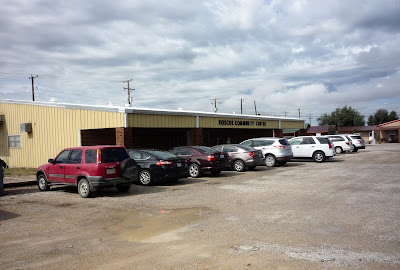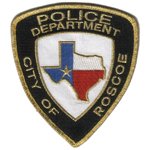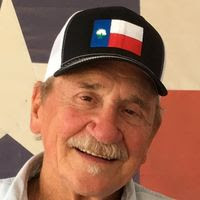 |
| A happy 1950s housewife with air conditioning. (Photo from Internet) |
On hot summer nights—and there were plenty of those in the drought years of the early fifties—we kids slept under the stars out in the back yard. We had a roll-away bed and cot that we kept in the garage and brought out at bedtime. My younger brother and I slept on the roll-away bed, and my older brother on the cot. It was much cooler outside at night and actually got chilly in the early mornings. At some point during the night, we would get under the cover, which we’d ignored when we went to bed. Our dogs, sometimes we had one and sometimes two, had learned not to bother us while we were sleeping, but our cats—we usually had about three—came around at times during the night for naps on the bed with us.
 |
| Me and my brother David in the back yard, about 1953. |
When I was about nine years old, my dad bought an evaporative cooler and put it in one of the north windows in the living room so it would be in the shade on hot summer days. These early air conditioners, also known as “swamp coolers” with “squirrel cages” worked by evaporating the water that dripped down through the shredded wood pads lining the walls of the air conditioner box and blowing the resulting cool air into the house. In order to save on electricity, my mother turned it on only when the temperature reached 100° outside. She would close all the living room windows and doors so that it cooled off just that room. We kids could go in there only if we sat in front of the air conditioner to cool off. No toys or running around were allowed, so we usually didn’t stay in there long before going back outside.
Over time, though, air conditioners came to be used more and more, especially when the compressor types got cheap enough to buy and run. The result was that people didn’t sit out as much in the evenings and so did less visiting with neighbors and passersby—or enjoying the sky with its sunset and coming of the stars.
 |
| Happiness is a TV set in the living room. (Photo from Internet) |
At first TV sets were too expensive for most people to afford, costing about $500, which was more like $5000 in today’s money. They had small black and white screens and came in a large console with many tubes in the back that had to be replaced when they burned out. They also required a large TV antenna on the roof of the house, so it was easy to see who had TVs and who didn’t. Although the knob on the set had settings for twelve normal channels and one UV, the only channel available in this area was channel 9, KRBC-TV. It didn’t really matter to anyone, though. TV was such a novelty that most people would watch whatever was on. Broadcasting started in the morning at six or six-thirty and closed at ten-thirty at night. If you got up in the morning before broadcasting began, you would sometimes sit and watch the test pattern until it did. In the evenings, you didn’t turn the TV off until you listened to the national anthem while watching a waving flag and fighter jets fly in formation.
One of the first TVs in town was in the Boys Club hall. It had comparatively excellent reception because its antenna was placed atop a telephone pole behind the hall and was larger and a lot higher than the ones on houses. On Saturday afternoons in the summer, the baseball “Game of the Week” was broadcast, and old men would come around and sit in the metal lawn chairs placed in a semi-circle before the TV. Along with the kids, a dozen people or more might be there watching and commenting on the game, no matter which teams were playing. And during the World Series, the crowds were even larger, and we all basked in the wonder that such a thing was even possible and we could watch it for free.
Watching television when there was only one channel—or even later when KPAR-TV, channel 12, began broadcasting in 1956—was a shared community experience even for those who were watching in their homes. Not only was the entire family gathered around the television, but the next day at school or work, one of the main topics of conversation would be the programs that had been on TV the night before since everyone was watching the same ones. Favorites were "Gunsmoke,” “Have Gun Will Travel,” “Life of Riley,” “The Ed Sullivan Show,” “Dragnet,” “Wrestling from Chicago,” and others. On Saturday mornings, kids could watch “Howdy Doody,” “The Lone Ranger,” “Superman,” “Lassie,” “The Little Rascals,” and “Mr. Wizard.”
There was also a lot of local programming with many shows emanating from the studios in Abilene. One of these was “The Slim Willet Show,” brought to you by Western Chevrolet. Slim Willet was an Abilene disc jockey who was also a country singer. He became famous with two hits, “Don’t Let the Stars Get in Your Eyes” and “Tool Pusher from Snyder.” Every week he would tell jokes, sing a couple of songs with his band, and showcase local talent. Another local show was “On the Farm” with Harry Holt, who always talked about area farming and ranching conditions. Another was “Cooking with Virginia,” which came on in the mornings. Virginia also occasionally showcased local talent and once invited the Roscoe Boys Club trampoline team to be on her show. As one of its performers, I felt very privileged to see first-hand what the TV studio looked like and how the shows were made. Later on, when KPAR-TV had their studios outside Sweetwater, we also performed on a March of Dimes Telethon and got to see what their studio was like.
As in other small towns all over Texas, television killed the local movie theaters. I don’t remember when the Joy Theater finally closed its doors, but it was only two or three years after the TV broadcasts began. The drive-in theaters, such as the Midway, between Roscoe and Sweetwater, hung on longer than that, but eventually, they too closed down for lack of customers. Television also had the effect of keeping people inside their own homes in the evenings, and, as more channels became available in the 1960s, this effect became even more pronounced. Even community social gatherings like church or the baseball games saw attendances steadily fall as time went on. In the early and mid fifties, pro football games were available only on the radio because they were played on Sundays and were therefore considered somewhat scandalous for being on the Sabbath. I think it was 1958 before they regularly played on television in west Texas and also in many other places. However, after Texas got the Dallas Cowboys in 1960, that all changed, and preachers soon learned to have the morning service over by twelve o’clock in the fall so people could get home in time to watch the Cowboys game.
In short, air conditioning and television were both rightfully hailed in the fifties as great technological innovations that improved people’s lives, but in doing so they also diminished the social life of the community and, over time, increased the isolation of families from their neighbors and from nature itself.
--o--
LOCAL WIND FARMS FEATURED IN MAJOR BRITISH DAILY THE GUARDIAN
 |
| Wind Turbines on the Roscoe Wind Farm. |
Like that earlier article, this one is more political than environmental, with the focus being on the apparent anomaly of major wind-energy development in a Republican state rather than a green-leaning Democratic one. Another common feature of both articles is the interviewing of Sweetwater energy lawyer Rod Wetsel. Perhaps it is this latter similarity along with the extensive interviewing of Greg Wortham, Sweetwater’s former mayor, that leads the article in another new direction, namely that of referring to Sweetwater as the Wind Capital of the World, unlike previous international articles and features whose focus is clearly on Roscoe and the Roscoe Wind Farm.
We will forgive The Guardian this minor error. After all, they were getting their information from a couple of guys from Sweetwater, and they did mention a couple of nice things about that “little speck on the map called Roscoe.” You can access the article by clicking here.
--o--
PLOWBOYS NAMED TO TEXAS SPORTS WRITERS ASSOCIATION 2A ALL-STATE FOOTBALL TEAM
Matthew Buckley has been named as a third-team tackle on the Texas Sports Writers Association’s 2A All-State Team. Brayden Beal received honorable mention as quarterback, and Francisco Garcia received honorable mention as running back.
--o--
PLOWBOYS AND PLOWGIRLS BEGIN TRACK SEASON AT HAMLIN FRIDAY
Spring is in the air, and the Plowboys and Plowgirls will compete in their first track meet of the year on Friday at the Long Sleeve Relays in Hamlin.
RCHS 2017 Track & Field Schedule:
Feb. 24 Long Sleeve Relays Hamlin
Mar. 2 Tiger Relays Anson
Mar. 10 Blackland Divide Relays Roscoe
Mar. 18 Piper Relays Hamlin
Mar. 23 Badger Relays Merkel
Mar. 31 Cottonwood Relays Roby
Apr. 6 District Meet Albany
Apr. 12 Area Meet @ McMurry Abilene
May 11-13 State Meet Austin
Roscoe Junior High 2017 Track & Field Schedule
Feb. 27 Tiger Relays Anson
Mar. 7 Blackland Divide Relays Roscoe
Mar. 21 Badger Relays Merkel
Mar. 30 Cottonwood Relays Roby
Apr. 8 District Meet Roscoe
--o--
SEVERAL PLOWBOYS PLACE IN SWEETWATER POWER LIFTING MEET
The Plowboys placed second in the power lifting meet held in Sweetwater last Thursday, losing out to Snyder, who finished first. Here are the Plowboy power lifters who placed:
Name Place Weight Class
Francisco Garcia 1 165
Matt Buckley 3 275
Joel Guia 4 242
Parker Payne 4 198
Andrew Deleon 4 123
Adrian Lomas 5 181
Tait Fullwood 5 165
Jetli Hobdy 6 123
--o--
WEATHER REPORT: SPRINGLIKE WEATHER IN FEBRUARY
 | |
| Yesterday's sunset under clear skies. |
Today and tomorrow should be even warmer than the last five days. Today’s forecast is for a high of 86° and for tomorrow a high of 84°, so don’t be surprised if you have to turn on the AC. However, a cold front will move through on Friday cooling the high down to 68° and the low to 36°. Saturday’s high is projected to be only 59°, but then on Sunday it will warm up to 74° and be back in the eighties on Monday and Tuesday. There is no rain in the forecast.
Randall Smith reports an unusual weather oddity occurring yesterday morning. He had frost on the ground but couldn’t find a thermometer with the mercury under 40°. I’m not sure how this could happen, but apparently it did. West Texas weather never ceases to amaze.
--o--
† SHARON SUE SCHNEIDER NAULT
Funeral services for Sharon Sue Schneider Nault, 70, were held on Monday, February 20, at Elliott-Hamil Funeral Home in Abilene. Burial followed at Shep Cemetery in Shep. She passed away last Wednesday, February 15, in Abilene.
Sharon was born on September 1, 1946, in Abilene to the late Edward C. and Lemma Tharpe Nichols Schneider. She lived in Roscoe and attended schools there until graduating from Roscoe High School in 1964. She then graduated from Abilene Christian University in 1968 with a BS in Education. She met her future husband, David Lloyd Nault in Anchorage, Alaska, while at her sister Edwina's wedding. He was the Best Man and she was the Maid of Honor. They married on October 3, 1970, in Roscoe and returned to Alaska where they lived first in Kodiak, then Hanes, and then Ketchikan. They also lived in Sierra Vista, Arizona. They returned to Texas in 1982, first living in Spring and then moving to Shep in 1993.
Sharon taught physical education and English in Texas and Alaska but she found her calling later with a career working in the State Vocational Rehabilitation Program. She assisted people with disabilities to return to work and found it very rewarding. She retired in 2010. She was a member of the Church of Christ and taught Children's Bible Class all of her adult life.
Preceding her in death were her husband, David L. Nault; her sister, Edwina Schneider Roswell and husband, Tim; her parents; and her nephew, Ross Roswell. Survivors include two sons, Scott D. Nault and wife, Cynthia, of Abilene, and J. Lee Nault and wife, Alecia, of Herndon, Virginia; one sister, Denise Schneider Sprott and husband, David, of Belton; three granddaughters, Cayelyn, Casey, and Lynne Nault; three grandsons, Cole, Caden, and Jericho Nault; six nieces and nephews; and numerous great-nieces and nephews.
You may view and sign the guestbook at www.elliott-hamil.com.
--o--
† BETTY GERALDINE COOPER ELLIS
Graveside services for Betty Geraldine Cooper Ellis, 85, of Dallas will be conducted by McCoy Funeral Home at the Roscoe Cemetery this Saturday, February 25, at 11:00am with Dr. Bob Monk officiating. She passed away on February 18.
Betty was born on February 19, 1931, to J.B. and Ellie Mae Cooper, Sr., of Roscoe. She was raised in the First United Methodist Church of Roscoe and was very active in the Methodist Youth Fellowship. After graduating from Roscoe High School in 1948, she continued her education as a Home Economics major at Southern Methodist University. During her time at SMU, Betty was an active member of Gamma Phi Beta. She met the love of her life James Richard Ellis while at SMU. They married May 31, 1952, at Perkins Chapel, being the first to marry in the "new" chapel. James worked as a lawyer and Betty as a secretary for Sun Oil Company as they started their married life together. Betty was the proud mother of Robert and Richard. She enjoyed being part of the United Methodist Women's Circle at Highland Park Methodist Church as well as volunteering for the Dallas Community Chest Trust Fund. She was a faithful child of God, loving wife, mother and grandmother. She was a friend to many.
Betty was preceded in death by her parents, Mr. and Mrs. J.B. Cooper, Sr.; husband, James Richard Ellis; brother, J.B. Cooper, Jr.; sister, Martha Eloise Cooper Reed; and cousins, Bill and Kathryn Birdwell.
Survivors include sister-in-law, Mava Cooper; sons, Robert Brian Ellis of Dallas and Richard Mark Ellis of Temple; daughter-in-law, Catherine McClane Ellis; granddaughters, Kaitlyn Michelle Ellis of Temple, Ashley Marie Ellis of College Station, and Lauren Nicole Ellis of Temple; nieces, Cheryl Johnnie, Alicyn Mayes, Stacia Jameson, Sue Cannon, and Eileen Hilliard; and cousin, Jim Birdwell.
Flowers may be delivered to McCoy Funeral Home or in lieu of flowers, memorial donations can be made to the First United Methodist Church of Roscoe.
A memorial service will be in Dallas at 10am on March 25, 2017 at Cox Chapel, Highland Park United Methodist Church. For the memorial service flowers may be sent to the church or in lieu of flowers donations can be made to the church.
--o--































